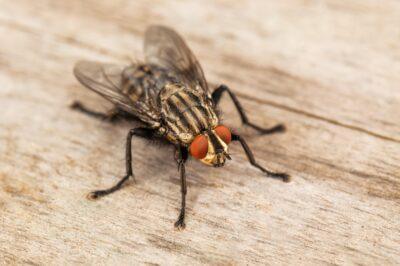
Using natural fly repellents can be effective to rid your home of flies.
Before we get started with the list of natural fly remedies, it’s important to note that you must identify the exact species of fly you’re dealing with before you can get rid of it. You have to know your enemy, right?
The house fly is the most common type of fly. It’s attracted to animal waste, garbage and any kind of decaying matter. You’ll likely see these throughout the year, but most commonly in the warm summer months. Fruit flies, like house flies, are also attracted to garbage, but more commonly like to linger near partially decayed, sweet-smelling fruit (hence the name).
Another common type of fly—that may be rearing its ugly head around this time of the year—is the cluster fly. Cluster flies are lethargic, slow-moving flies that are attracted to warm, sunny places. You’ll likely see them if you have a large, productive garden, as they are parasitic to earthworms. Cluster flies, unlike house flies, do not carry or transmit disease, but are a nuisance to have around.
Other possible—but less common—types of flies include blow flies, flesh flies, drain flies and stable flies. You likely have no need to worry about these species invading your domesticity.
1. Homemade fly strips
Fly strips (or fly tapes) are a great way to get rid of flies, but come with many ugly side effects. The unsightly and messy yellow “goop” that attracts and eventually kills unwanted flies contains chemicals and leaves a disgusting, slimy residue around your house.
All natural way to rid your home of pesky insects [1]
A more natural—and less gross—solution is to create your own fly paper. It is much more attractive and uses non-toxic materials that can be found around the house. To create, cut a brown paper bag into 2-3-inch-wide strips. Dip the strips into a mixture of sugar, honey and water. Then, hang the strips using twine wherever flies like to congregate. If they happen to dry out before they’ve annihilated your fly population, simply spritz them with water.
Less mess, less stress.
2. Apple cider vinegar traps
Apple cider vinegar traps are another way of ridding yourself of unwanted flies. Flies can often be found even in the most spotless of kitchens. Simply place an open bowl of apple cider vinegar, water and dish soap near a trashcan or sink. Within a day or two you will find the bowl swimming with the dead buggers, without endangering food safety or the health of your curious pets.
3. Plants
Besides the obvious Venus fly traps, there are numerous plants that can be grown to naturally lower your fly population. Herbs such as basil, bay laurel, rosemary, lavender, mint and even citronella help to repel flies. Because they have strong scents, flies generally stay away from these multipurpose plants.
Most fly-repelling plants can be grown outside or potted indoors, and several are even perennial. This low-maintenance option will help you season your tomato sauce and maintain a pest-free homestead.
4. Essential oils
If fresh or live herbs don’t work as well as you’d like in your fly-combatting efforts, you can also extract the oils from these plants. Harvest them in the morning after the dew has dried but before the sun has burned off any oils. Place the oils in diffusers or open jars around the house.
Other helpful essential oils include tea tree, eucalyptus and cedar.
5. Plastic water bags
This is probably the easiest and one of the most effective fly remedies. A bag of water serves as a lens and reflects movement. Flies are naturally skittish, and will fly away from the bag out of fear.
Fill a plastic bag with water, and hang wherever you tend to find flies (such as near outdoor trash cans). It should repel the flies before they get a chance to invade your domesticity.
6. Place cloves in citrus
While we tend to like the smell and flavor of cloves, flies absolutely abhor them. Cloves are the most effective against houseflies. As a result, flies will stay away from areas where they are present.
They also hate the fresh smell of citrus, so what you will need to do is take an orange or lemon and cut it in half. Poke about a dozen individual cloves into each half of the citrus. Place the slices on a countertop or other open surface. You will find that your fly population drops dramatically.
7. DIY fly killer spray
If you’re like most people, you hate using chemical-ridden sprays around the house—especially in places where you eat. An easy fly killer alternative is to combine dish soap, Windex, vinegar, and water in a large spray bottle.
This method requires vigilance, as you’ll need to spray the flies as they appear, but after several applications you should find that the amount of flies decreases.
8. Red wine traps
Flies love the sweet smell of red wine. If you place red wine in a bowl with some dish soap or vinegar, they’ll be drawn to the scent of the wine and drown in the liquid.
9. Lure them out with light
Most bugs—including flies—are attracted to light. Darken the room in which you tend to find them by lowering blinds.
You can also place light traps in an attic or other enclosed space that humans typically don’t frequent. Light traps will keep flies out without the application of stinky, toxic chemicals.
10. Get physical
It seems obvious, but if you don’t want flies in your house, don’t invite them in! Take out the trash on a regular basis, and keep trash bins far away from your house. Keep your kitchen tidy and make sure there aren’t any stray crumbs hiding in nooks and crannies. Cover pet food dishes and don’t leave food out on the counter.
Make sure your house is well sealed—cluster flies like to invade in the fall months when they are looking for a place to spend the cold winter months. These pests can find their way into the house through the smallest of spaces, so make sure any air gaps are sealed and holes in window screens are repaired before these buggers become a problem.
What tips would you add? Share your advice in the section below:
